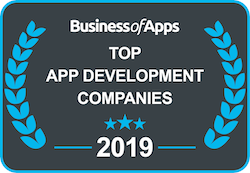Here at Red C we work with a lot of startups, we love the energy that a startup team brings, the new ideas and the passion for problem-solving. Somewhere along the journey from idea to a product in the market, most startups have to look for investment.

It’s hard to convince a potential investor to put money into an idea without presenting a prototype of the final product. So, before trying to raise funds most startups we have worked with commence their journey with the Red C ‘Design and Discovery’ package. This process involves refining the product into a clear MVP (Minimal Viable Product), including the minimum set of features that solve the core problem the app/system is trying to provide a solution for. Following concept refinement is the comprehensive design process in order to create designs of the screens linked together through a clickable prototype which can be tested and shared with stakeholders. After the design and discovery stage, the app is ready to be built and Red C will provide accurate estimates of costs and timescales as by this stage we will have a detailed set of features and a clear understanding of how they will be implemented. At the end of this phase, you should have everything you need to convince potential investors to put money into your product. It’s hard to know where to start when looking for funding so we’ve listed the best sources of funding we have come across whilst working with startups over the years:
1. Business grants and awards
The UK offers several grants and awards to fund startup ideas, these awards are great if you meet the criteria they are looking for so are a good place to start. Innovate UK always has plenty of grants and awards open for applications so it’s worth seeing if any current grants fit your startup’s profile.
Pros:
– No equity stake is required
– You are not required to pay the money back
Cons:
– Normally has to be matched with other sources of funding
– There are normally restrictions on how the money is spent
– lots of admin for compliance is required
2. Angel Investors
Angel Investors are high net worth individuals or startup founders who have sold their business(es). They usually invest very early on into startups and are prepared to take a fairly large risk, in return they will ask for a relatively large amount of equity. Angel Investors usually invest in a particular sector which they have expertise or experience in and offer business advice and strategy as well as funding. Angel investors often work in networks to spread the risk and would look to invest below £150,000. Although they don’t expect a startup to have paying customers before investing they usually expect to see a prototype app and a convincing business plan beforehand. Click here to find potential Angel Investors.
Pros:
– Willing to invest at an early stage
– Will provide advice and expertise
Cons:
– Angel Investors usually want a large equity stake
– Very hard to impress/win-over
3. SEIS (Seed Enterprise Investment Scheme) Tax Relief
This is a government scheme which encourages investment in early stage startups, although it’s technically not a source of funding it offers a big incentive to potential investors. If you register your company for SEIS then anyone who invests will be able to claim tax relief on half of the investment, they will also not pay any tax on any capital gains when they sell their shares. You can find out more here.
If your business is a UK limited company you can claim R&D tax credits, which enable money spent on research and development to be offset against corporation tax.
4. Crowdfunding
Crowdfunding is a great option for funding your startup, if you have a great idea and a compelling prototype you may be able to convince the public to invest in your startup. The great advantage of this approach is that the investors will more than likely become your customers too! There are two types of crowdfunding, either offering shares in your startup or ‘pre-selling’ your product before you build it at a discounted price. Kickstarter is the most famous pre-selling platform and is great if your app is connected to a physical product or has large consumer appeal. Seedr’s is a platform where people can buy a small stake in your startup, however, it is a very competitive market so your marketing materials and prototype have to look great and stand out from the crowd, you will also need to make sure you have a decent number of investors already lined up, who will give your raise some momentum.
Pros:
– Open to very early stage startups
– A great way to test your idea with future markets
Cons:
– Very competitive
5. Partner with a business
Partnering with businesses is a great way to fund your startup. It’s very likely that there are traditional businesses in your sector who have a large customer base but lack the resources or are too risk-averse to try a new way of doing things. An advantage of partnering with a business is that they may help promote your product to their existing customers. The drawbacks are that they might want a level of control or exclusivity over your business that you may not be comfortable with.
Pros:
– Partner will bring industry experience and customers
Cons:
– May want a large stake and control
6. VC Funding (Venture Capital)
VC’s are the big boys of startup funding. VC’s normally operate in the stage after Angel Investment and would look to invest a minimum of £500,000 going up to several million pounds. Because they invest such large sums on behalf of corporate investors they are fairly risk-adverse and want to see either great traction or revenue generation. Once your startup is up and running and starting to breakeven a VC is a great way to take your business to the next level.
Pros:
– Large investments
– Good advice and contacts
Cons:
– VC’s will take a large stake of equity and want a place on your board
– VC’s will want a high level of control
7. Bootstrapping
Bootstrapping refers to using your own resources to launch your startup without funding. This is a great option if you can cover your expenses through savings or a flexible job. There are a lot of skills required to launch a startup from a design, finance, business and technical perspective, it’s unlikely you will possess all of these, recruiting friends to help is a good option. There are lots of tools out there, such as Balsamiq, to help mockup your ideas so you can refine the product as much as you possible yourself. It’s likely you will need some help at the development stage but if you keep the product as simple as possible starting on only one platform (iOS or Android) you will be able to keep your development costs down, once you start to accumulate paying customers it will be much easier to access funding to build on your product.
Pros:
– No need to give away equity or control
Cons:
– Unless you have a large amount of savings or a very technical background you will be limited in what you can build
8. Bank loan
A bank loan is a great option especially if you are looking for a fairly small amount of money, although UK banks are fairly risk adverse they maybe willing to give you a loan if you have a sound business plan and extensive market research to demonstrate the demand for your product. They may well require some collateral on the loans such as your house, so be sure you can still afford to make payments should things not go as planned.
Pros:
– No equity stake in your business is required
– Quick and easy to access
Cons:
– If your startup fails you will still need to pay back the loan
– Potentially a high interest rate



